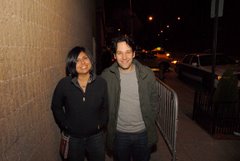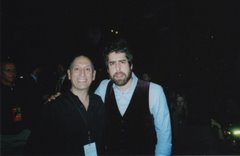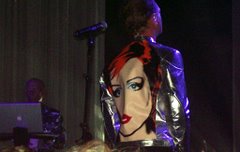SCREENED OUT – Code-Busters/Out & Open (Part 1)
 FLICK Tonight Turner Classic Movies presents night seven of eight of its series focusing on gay images in film and my personal favorite lineup. Before pointing out some of the films’ deficiencies, it should be noted that there is a lot of distinguished talent involved in tonight’s selections that, in addition to the context of film history, make for worthwhile viewing.
FLICK Tonight Turner Classic Movies presents night seven of eight of its series focusing on gay images in film and my personal favorite lineup. Before pointing out some of the films’ deficiencies, it should be noted that there is a lot of distinguished talent involved in tonight’s selections that, in addition to the context of film history, make for worthwhile viewing.
In the late 1950s, the domination of the Motion Picture Production Code was waning as writers and directors began to challenge limitations and explore restrictive subjects. There is still a lot of self-hatred going on in these films, but they are transitioning toward openness and breaking down the closet door, despite some negative images. Three of the films are adaptations of Broadway plays but only the first two have altered endings required by the Production Code as well as the Catholic Legion of Decency.
In Vincent Minnelli’s Tea and Sympathy (1956), John Kerr recreates his stage role as a teenager cast as an outsider and harassed by schoolmates for being a sissy. What’s really going on is the fear of accusations, and assumptions being made just because Tom (Kerr) doesn’t want to play football and prefers the company of the coach’s wife (Deborah Kerr). The explicit change of the ending from the stage version offers the love of a good woman as a solution to the "problem", but because she commits adultery, she must suffer too. 
Audrey Hepburn and Shirley MacLaine star in the 1962 film version of Lillian Hellman’s The Children’s Hour, about two women running a girl’s school. Accusations of lesbianism by a lying student create an awakening within Martha (MacLaine) realizing that she really has been in love with Karen (Hepburn). The discovery ultimately destroys more than their friendship. Originally directed by William Wyler in 1936 with many alterations under the title These Three, he decided to re-film it, bringing back many of the central themes and the original title.
The Motion Picture Production Code dismantled in 1968 allowing more frankness and exposition of gay-themed films, but perhaps taking baby steps away from the safety of the closet. Reinforcing stereotypes became problematic, particularly in Staircase (1969), starring Richard Burton and Rex Harrison as a pair of bitchy hairstylists. 
Another adaptation battling stereotypes is Mart Crowley’s infamous and landmark play The Boys in the Band (1970). On the brink of the gay right’s movement, the action takes place in one evening at a birthday party where the guests vary from self-assured to acid-tongued self-loathing types, including a hunky cowboy as a birthday present. Starring the original theater cast, there are many thought-provoking moments intertwined with witty ones.
Ending the night is Victim, the 1961 British thriller starring Dirk Bogarde as a lawyer confronting blackmailers who pushed a past love to suicide. Of the films screened tonight, Victim exposes oppression and is the one that most urges tolerance and understanding by presenting the dangers of hiding one’s true self plus giving us a character that dares to choose visibility.
8pm Tea and Sympathy; 10:15 pm The Children’s Hour; 12:15 am Staircase; 2:15 am; The Boys in the Band; 4:30am Victim














